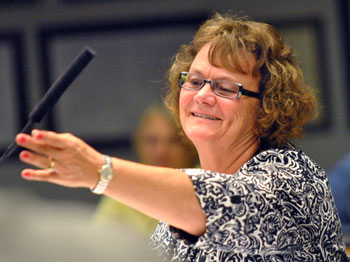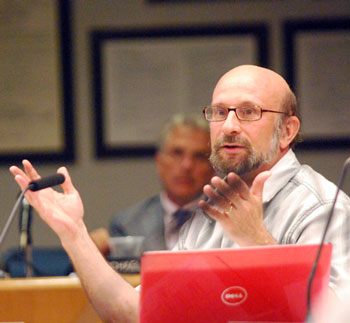Next Steps for AATA’s Possible Transition
Ann Arbor Transportation Authority board meeting (Aug. 16, 2012): The AATA board achieved its minimum quorum of four out of seven members at its monthly meeting. But they were joined by three as-yet non-voting members of a possible new transit authority, The Washtenaw Ride – which could have a countywide governance structure and service area.

Karen Lovejoy Roe, Ypsilanti Township clerk, attended the AATA board’s Aug. 16 meeting as representative of the Southeast District on an as-yet unincorporated board of a countywide transportation authority. During the meeting she expressed enthusiastic support for expanded transit. (Photos by the writer.)
As part of that goal of establishing the new authority, the AATA board gave final approval to a four-party agreement – between the city of Ann Arbor, the city of Ypsilanti, Washtenaw County and the AATA. The agreement would establish a framework for the transition of the AATA to a transit authority incorporated under Act 196 of 1986 – to be called The Washtenaw Ride. That authority would have a 15-member board.
An unincorporated version of the Washtenaw Ride’s board (the U196) has been meeting since late 2011. The three guests at the table for the Aug. 16 AATA board meeting are representatives of three districts in the possible new authority: Karen Lovejoy Roe (Southeast District), Bob Mester (West District) and David Phillips (Northeast District).
Those three were not there to vote, and did not participate in deliberations, though they could have. However, Lovejoy Roe – who serves as Ypsilanti Township clerk, an elected position – gave one of the most enthusiastic statements of support for the countywide initiative that’s been heard at the AATA board table over the last two years. “I’m just really excited about where we’re headed as a community, as a county at large. I know that there’s been a lot of hiccups, but I think that that’s normal … I’m committed, and I think that those who’ve asked me to be here working willingly and openly to do what’s best for all county residents [are, too] …”
One element of the 30-year vision that the AATA has developed for countywide transportation is a north-south commuter rail connection between Ann Arbor and Howell, in Livingston County. And the planning effort was given continued support at the Aug. 16 meeting when the board awarded a $105,200 contract to SmithGroupJJR for station location and design services in connection with the WALLY (Washtenaw and Livingston Railway) project.
That overall planning effort was given a boost by a somewhat unexpected $640,000 federal grant to the AATA and Michigan Dept. of Transportation. The grant was awarded on Aug. 6, 2012 under the Transportation, Community and System Preservation (TCSP) program. AATA had applied for the grant last November, but did not have high expectations, given the competitive nature of the grants.
In other business, the board decided to accept a non-applicable penalty – which has no actual impact – and not comply with Michigan’s Public Act 192 for its unionized employees. The act mandates limits on how much public employers can contribute to their employee health care costs. The decision was essentially based on deference to a federal law that applies to agencies receiving federal funding – like the AATA. That federal law requires benefits like health care to be collectively bargained, not stipulated. Under the state law, failure by the AATA to comply would just mean that it would be denied state funds to which it is not even entitled.
In the meeting’s other business item, the AATA approved a three-year contract with CBS Outdoor Advertising of Lexington, New York, to handle placement of ads on its buses and bus stops. That’s a change from the previous contract, which was held by Transit Advertising Group (TAG) of Farmington Hills, Mich. [Full Story]




